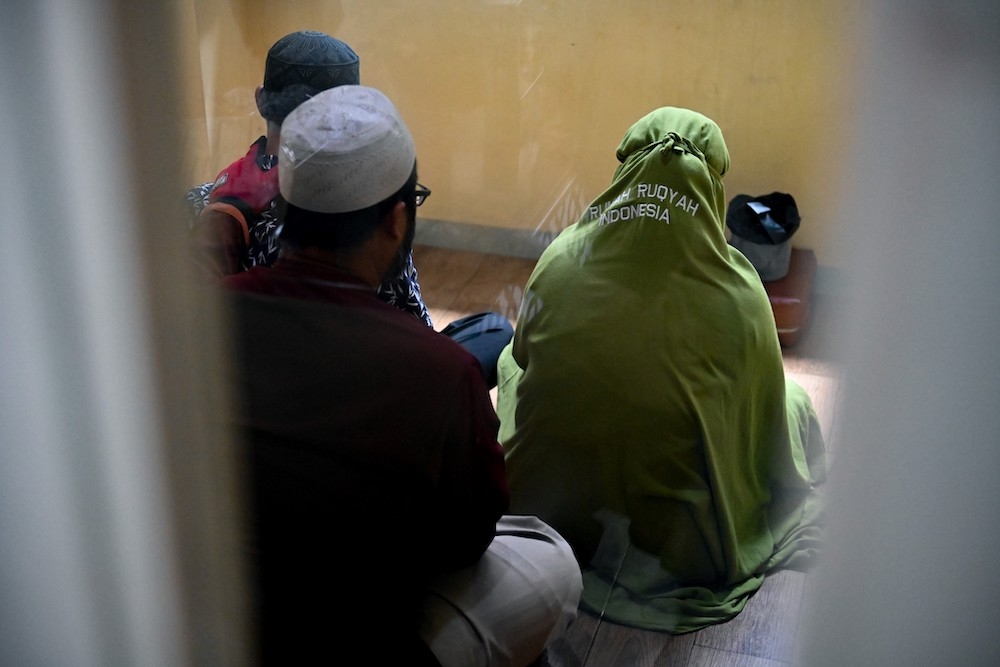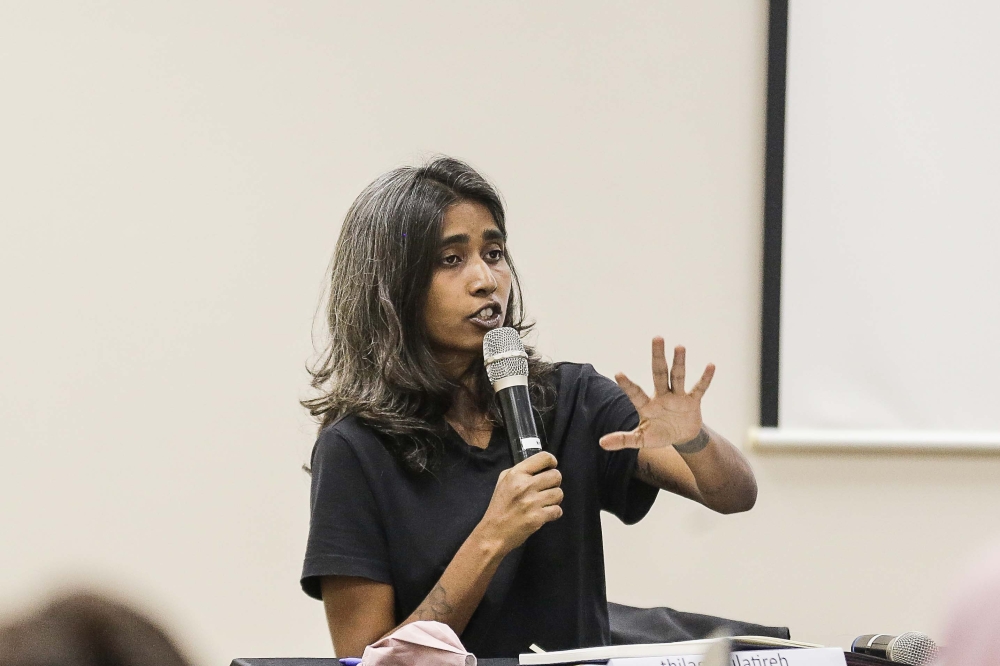KUALA LUMPUR, Dec 14 — Linda, a trans woman, said she was taken by her parents to a Christian seminar in 2016 to “cure her”. She described how other queer persons who were also dragged there were crying, even as their parents were clinging to every word of the “ex-trans” pastor who conducted the event.
Darren Tan said he had to go through “exorcisms” in two churches when he was 15. He is 28 now and still gay, but has had suicidal thoughts.
Meanwhile, trans man James started getting non-epileptic seizures during his “treatment” in “ex-gay ministry” conversion programmes and ended up being diagnosed with anxiety and depression.
Another trans woman, Sonia, said she had to attend one-on-one classes with an ustaz, or Islamic religious teacher, while in school, before growing up into an adult who has allegedly been arrested and harassed by religious authorities.
“Of late, I feel there is a tiny voice that says, ‘You are living a useless life. What is the purpose of you living? What for?’ The voices are there every now and then, and making me ask myself, ‘Do people like me deserve to live in this world? Should I just die?’” Sonia was quoted saying in a 2021 report on freedom of expression by advocacy group Justice for Sisters (JFS).
These are just a few of the anecdotes collected by JFS for its campaign called "Balik Ke Pangkal Jalan" to reclaim the meaning of the Malay phrase, which means “returning to the ‘right’ path” and used when referring to the practice of conversion therapy — an attempt to “rehabilitate” lesbian, gay, bisexual, transgender or queer (LGTBQ) persons to become heterosexual or cisgender.
In a recent study titled “Conversion Practices or Efforts to Change LGBTIQ+ People in Malaysia,” JFS also found that seven in 10 of its respondents said they were pressured to change their sexual orientation, gender identity, gender expression, and sex characteristics (Sogie) by their families, and this is being facilitated by religious institutions.
“It’s difficult to end conversion practices as Malaysia has too many conservative, religious, uptight and traditional-minded people.
“People who have the opportunity to migrate should do so. I too wish to migrate to more progressive countries,” said a respondent who wished to stay anonymous.
In total, two-thirds of respondents said they had faced pressure to change their Sogie.
At the same time, religion was found to be a significant factor in the promotion and continuation of conversion practices, also known as conversion therapy.
Around four in 10 respondents said they were offered Sogie-change efforts during religious programmes while respondents from Muslim backgrounds reported a higher occurrence of pressure and impact of Sogie-change efforts.
Conversion therapy, which consists of psychological treatment or spiritual counselling to change a person’s sexual orientation from homosexual or bisexual to heterosexual, is widely seen by the medical and scientific community as potentially harmful and a form of pseudoscience.
The practice is opposed and has been legally challenged, or even banned, in countries such as Australia, Brazil, Chile, China, Ecuador, Israel, Lebanon, Malta, South Africa, Switzerland, the United Kingdom, and the United States.

Family intervention
In the JFS study, one out of every 10 respondents said they were forcibly sent to an external party to be corrected, with most saying that it was due to being outed to family members in addition to pressure or advice to change.
Of the 33 respondents who had been forcibly sent, 22 had experienced the conversion practice multiple times.
However, six of the respondents had a positive outcome as they found that their family members and other people began to accept their Sogie following the experience.
Overall, respondents reported severely negative outcomes from undergoing Sogie-change efforts due to their low access to justice.
“LGBTIQ and gender-diverse people shared a similar pattern of response: They experience Sogie-change efforts or pressure, resulting in their pretending to be ‘straight’ or suppressing their Sogie.
“This leads to increased burdens on their mental health; strained relationships, particularly among family members; and some move out from home. Some responses show resolution and acceptance following the strained relationships; however, this comes at a cost, both emotional and financial,” said the report.
About 45.4 per cent said they experienced mental health strain while 32.5 per cent said they experienced suicidal thoughts and attempts. The Sogie-change attempts also resulted in 4.9 per cent dropping out of school.
“LGBTIQ people face immense pressure to change Sogie, resulting in multiple impacts, including but not limited to their mental health, rights, access to education, and freedom of religion. The pressure comes from many sources, including the media,” the report continued to add.

Escaping conversion
Four of the respondents also noted a sense of hopelessness over living in Malaysia and a lack of confidence in the government ever affirming queer rights, with their only options being to either stay hidden or to migrate to a more progressive country.
The report found that the most vulnerable to conversion therapy were youths below the age of 30, trans people, and those from Muslim backgrounds.
“Trans persons consistently report among the highest prevalence in terms of pressure to change their gender identity, being forced to perform gendered roles, experiencing suicidal ideation, having voluntarily sought Sogie-change services, and being offered Sogie-change services.
“There was a higher level of migration among trans and gender-diverse respondents,” it said.
Despite making up only 35.3 per cent of respondents, 70.6 per cent of respondents who said they were offered conversion efforts come from Muslim backgrounds.
The study had surveyed 157 Malaysians from the LGBT community between 12 and 61 years’ old in 11 states and staying abroad, with over half of them below 30.
Of those, 43.6 per cent of respondents identified as gay, followed by bisexual (14.7 per cent), and lesbian (9.6 per cent). Meanwhile, 36.5 per cent identified as cisgender men, followed by trans women (21.8 per cent), trans men (14.7 per cent), and five respondents identified as intersex.
“In this country, I don’t think they will end such things and will keep going after us especially for their political benefits and whatnot.
“All that we have to do is to really take care of each other and, being minorities ourselves, protecting our images and reputations is the utmost action of all, ensuring them that our existence is neither a threat nor crime towards the country’s well-being,” a respondent told JFS.
As part of the campaign, JFS will be launching its media guide on reporting conversion practices in Malaysia today.
The issue came into the spotlight recently following the Johor state government's announcement that it is in the process of creating a centre to “rehabilitate” those who practise same-sex relationships for going against established Islamic teachings — with religious affairs exco Mohd Fared Mohd Khalid touting it as the first of its kind here.
In response, JFS co-founder S. Thilaga had said that the establishment of such a centre raised concerns about the potential violation of human rights, including the rights to equality and non-discrimination, privacy, and a life of dignity, free from torture.
She added that the Federal Constitution and international human rights laws protect LGBT people against criminalisation and efforts to change a person’s Sogie.




















